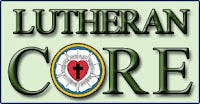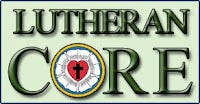Impressions of LutheranCORE Convocation

On Friday of this past week, I was one of 1200 people to gather in the sanctuary of Holy Spirit Roman Catholic Church in Fishers, Indiana for a convocation of what is now known as The Lutheran Coalition for Renewal (or LutheranCORE). The organization, formerly known as The Lutheran Coalition for Reform, has been an umbrella organization for eleven groups within the Evangelical Lutheran Church in America (ELCA), working to call that body back to the historic Lutheran position of the Bible as the "source and norm" of the Church's "life, faith, and practice."
A belief in the Bible--the Old and New Testaments--as the gauge (or canon) of normative truth for Christians, has been central to Lutherans from the beginning of the Reformation triggered by Martin Luther in 1517.
Many in the church hierarchy and interest groups have called that belief into question during the life of the ELCA, established twenty years ago when three Lutheran bodies formed the new church. ELCA theologians like Marcus Borg are widely read and revered among some ELCA clergy for their rejection of the deity of Christ, the resurrection, and the virgin birth.
But none of these heretical departures from the teaching of Scripture were ever made official until the ELCA Churchwide Assembly voted in August to allow congregations to ordain gay persons in committed relationships and to perform ceremonies blessing the unions of gay persons.
This is clearly contrary to the teaching of Scripture and meant that the ELCA has entered a state of heresy. I continue to serve as a pastor in the ELCA in what is called "confessional resistance" and I serve a congregation of the ELCA, which I will be asking in the next several months to decide where it stands.
Below I'm linking to a page with PDF files of presentations that were made at the LutheranCORE convocation, along with press releases about it. Let me just say a few things about the convocation, from the perspective of one in attendance.
(1) The atmosphere was both sad and joyful. On the one hand, there was profound sadness that a Church in whose early life so many of us had poured devotion, prayer, and hard work, had chosen to so depart from the will of God. (I put myself on the line as a young pastor in a staunchly Lutheran community that was deeply wary of being part of the ELCA when I worked hard for its acceptance, for example.)
But there was great joy, too. That positive, believing tone, in spite of the unknown future we face, was evidenced in the opening words of former Southern Ohio Synod bishop, Ken Sauer, a disappointed architect of the ELCA: "Here is the most important thing I want to share with you: Christ is risen! He is risen indeed!"
The focus was not only on where we were and how, by the political machinations of those who see the Church primarily as an organ of social action, we had gotten there. A major focus was on where, by the power of the risen Christ, we can go from here.
(2) There was great hopefulness. In that room, there was an almost electric sense of certainty that the Lord Jesus would help us, in some form or another, erect a strong confessional Lutheran identity that will be neither liberal or conservative, but deeply and confessionally Lutheran.
(3) There was a commitment to moving slowly quickly. People wanted to be prayerful and deliberate about what they did. But there was also the sense that the ELCA, barring a miracle, was unwilling to repent or recant. That was why on Saturday, the convocation voted to spend a year trying to define the future of our branch of confessional Lutheranism.
(4) I was pleased to see not only eight former ELCA bishops present and committed to LutheranCORE's renewal aims, including my former bishop, but also so many of my Southern Ohio Synod colleagues. They were part of a broad cross-section of ELCA Lutherans; they came from 41 states and 3 Canadian provinces. (In addition, there was a Lutheran pastor from Brazil, here to see how Lutherans were dealing with this heresy, as it's apparently beginning to show itself in his country.)
It hasn't always been clear who was for or against the proposals passed at the Churchwide Assembly because those of us opposed to them have felt bullied into silence for twenty years, something for which I now publicly and achingly repent.
The mood of the convocation seemed well-summarized by one pastor who told me, "I feel like I've come home." That's how I felt, too: at home in a fellowship that confesses the Bible as the Word of God, that believes in sharing Christ with others and making disciples, that believes that everyone needs Christ. No exceptions. And no exemptions for preferred sins, either.*
Go here to read convocation documents in PDF format.
A Vision for LutheranCORE: Bishop Paull Spring
Reflections from Communion of African Congregations of North America
Greeting to LutheranCORE Convocation of Pastor Eddy Perez, representing Hispanic congregations of the Florida-Bahamas Synod
Also: Article by Dr. James Nestingen, theologian of the ELCA, regarding Churchwide Assembly decisions
[UPDATE: The best and most accessible book for laypersons as well as clergy in looking at what the Scriptures have to say about the question of what the Bible has to say about homosexual practice is Pastor David N. Glesne's Understanding Homosexuality: Perspectives for the Local Church. I highly recommend it!]
[ANOTHER UPDATE: "If I profess with the loudest voice and clearest exposition every portion of the Word of God except precisely that little point which the world and the devil are at that moment attacking, I am not confessing Christ, however boldly I may be confessing Him." (Martin Luther)]
*In case anybody is interested, I advocate full civil rights for gays and lesbians. The question of ordination of gays or lesbians in committed relationships or the blessing of such relationships in general are entirely separate from the question of civil rights. I talk more about that here.
Later, I'll be presenting a more detailed discussion of what the Bible has to say about homosexuality. God loves all people. Christ died for all people. But God calls us to repent and believe in Christ. Repentance means to turn back to God, away from our sins and the sinfulness of our world, confessing to God the ways in which we have diverged from God's will, and seeking God's help to walk within that will.



